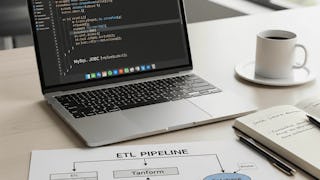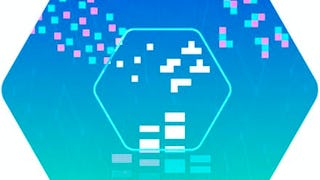Découvrez les deux approches différentes pour convertir des données brutes en données prêtes à être analysées. La première est le processus d'extraction, de transformation et de chargement (ETL). L'autre est le processus d'extraction, de chargement et de transformation (ELT). Les processus ETL s'appliquent aux entrepôts de données et aux marteaux de données. Les processus ELT s'appliquent aux lacs de données, où les données sont transformées à la demande par l'application requérante/appelante.

Profitez d'une croissance illimitée avec un an de Coursera Plus pour 199 $ (régulièrement 399 $). Économisez maintenant.

ETL et pipelines de données avec Shell, Airflow et Kafka
Ce cours fait partie de plusieurs programmes.



Instructeurs : Jeff Grossman
65 510 déjà inscrits
Inclus avec
(440 avis)
Expérience recommandée
Ce que vous apprendrez
Décrire et comparer les processus d'extraction, de transformation et de chargement (ETL) et les processus d'extraction, de chargement et de transformation (ELT).
Expliquez les modes d'exécution batch et concurrent.
Mettre en œuvre le flux de travail ETL à l'aide de fonctions Bash et Python.
Décrire les composants, les processus, les outils et les technologies des pipelines de données.
Compétences que vous acquerrez
- Catégorie : Optimisation des performances
- Catégorie : Évolutivité
- Catégorie : Web scraping
- Catégorie : Script Shell
- Catégorie : Shell Unix
- Catégorie : Traitement des données
- Catégorie : Transformation de données
- Catégorie : Entreposage de données
- Catégorie : Extraction, transformation, chargement (ETL)
- Catégorie : Flux d'air Apache
- Catégorie : Pipelines de données
- Catégorie : Big Data
- Catégorie : Intégration de données
- Catégorie : Data Mart
- Catégorie : Migration de données
- Catégorie : Apache Kafka
Détails à connaître

Ajouter à votre profil LinkedIn
Découvrez comment les employés des entreprises prestigieuses maîtrisent des compétences recherchées

Élaborez votre expertise du sujet
- Apprenez de nouveaux concepts auprès d'experts du secteur
- Acquérez une compréhension de base d'un sujet ou d'un outil
- Développez des compétences professionnelles avec des projets pratiques
- Obtenez un certificat professionnel partageable

Il y a 5 modules dans ce cours
Les processus ETL ou Extraction, transformation et chargement sont utilisés dans les cas où la flexibilité, la vitesse et l'évolutivité des données sont importantes. Vous explorerez certaines différences clés entre des processus similaires, ETL et ELT, qui incluent la place de la transformation, la flexibilité, la prise en charge du Big data et le time-to-insight. Vous apprendrez qu'il y a une demande croissante d'accès aux données brutes qui motive l'évolution de l'ETL vers l'ELT. L'extraction de données implique des technologies avancées, notamment l'interrogation de bases de données, le web scraping et les API. Vous apprendrez également que la transformation des données consiste à formater les données pour les adapter à l'application et que les données sont chargées par lots ou en flux continu.
Inclus
7 vidéos2 lectures2 devoirs1 plugin
Les pipelines d'extraction, de transformation et de chargement (ETL) sont créés à l'aide de scripts Bash qui peuvent être exécutés selon un calendrier à l'aide de cron. Les pipelines de données déplacent les données d'un endroit, ou d'une forme, à un autre. Les processus de pipeline de données comprennent la planification ou le déclenchement, la surveillance, la maintenance et l'optimisation. En outre, les pipelines de traitement par lots extraient et exploitent des lots de données. Les pipelines de données en continu, quant à eux, ingèrent des paquets de données un par un en succession rapide. Dans ce module, vous apprendrez que les pipelines de streaming s'appliquent lorsque les données les plus récentes sont nécessaires. Vous découvrirez que la parallélisation et les tampons d'E/S permettent d'atténuer les goulets d'étranglement. Vous apprendrez également à décrire les performances des pipelines de données en termes de latence et de débit.
Inclus
5 vidéos4 lectures4 devoirs1 élément d'application1 plugin
Le principal avantage de l'approche d'Apache Airflow pour représenter les pipelines de données sous forme de DAG est qu'ils sont exprimés sous forme de code, ce qui rend vos pipelines de données plus faciles à maintenir, à tester et à collaborer. Les tâches, les nœuds d'un DAG, sont créées en implémentant les opérateurs intégrés d'Airflow. Dans ce module, vous apprendrez qu'Apache Airflow possède une interface utilisateur riche qui simplifie le travail avec les pipelines de données. Vous explorerez comment visualiser votre DAG en mode graphe ou en mode arbre. Vous découvrirez également les composants clés d'un fichier de définition de DAG, et vous apprendrez que les logs Airflow sont sauvegardés dans des systèmes de fichiers locaux et ensuite envoyés vers un stockage en nuage, des moteurs de recherche, et des analyseurs de logs.
Inclus
5 vidéos1 lecture2 devoirs4 éléments d'application1 plugin
Apache Kafka est un pipeline de streaming d'événements open source très populaire. Un événement est un type de données qui décrit les mises à jour de l'état observable de l'entité au fil du temps. Les fournisseurs de services Kafka les plus populaires sont Confluent Cloud, IBM Event Stream et Amazon MSK. En outre, l'API Kafka Streams est une bibliothèque client qui vous aide à traiter les données dans les pipelines de streaming d'événements. Dans ce module, vous apprendrez que les principaux composants de Kafka sont les courtiers, les sujets, les partitions, les réplications, les producteurs et les consommateurs. Vous explorerez deux types particuliers de processeurs dans la topologie de traitement des flux de l'API Kafka Stream : Le processeur de source et le processeur de puits. Vous apprendrez également à construire des pipelines de streaming d'événements à l'aide de Kafka.
Inclus
4 vidéos1 lecture2 devoirs3 éléments d'application1 plugin
Dans ce dernier module de travail, vous appliquerez vos nouvelles connaissances pour explorer deux laboratoires pratiques très intéressants. "Création de pipelines de données ETL à l'aide d'Apache Airflow" et "Création de pipelines de données en continu à l'aide de Kafka". Vous explorerez la construction de ces pipelines ETL en utilisant des scénarios du monde réel. Vous extrairez, transformerez et chargerez des données dans un fichier CSV. Vous créerez également un sujet nommé "toll" dans Apache Kafka, vous téléchargerez et personnaliserez un consommateur de données en continu, et vous vérifierez que les données en continu ont été collectées dans la table de la base de données.
Inclus
4 lectures1 devoir1 évaluation par les pairs3 éléments d'application
Obtenez un certificat professionnel
Ajoutez ce titre à votre profil LinkedIn, à votre curriculum vitae ou à votre CV. Partagez-le sur les médias sociaux et dans votre évaluation des performances.
Instructeurs


Offert par
En savoir plus sur Gestion des données
 Statut : Essai gratuit
Statut : Essai gratuit Statut : Essai gratuit
Statut : Essai gratuit Statut : Essai gratuit
Statut : Essai gratuit Statut : Essai gratuit
Statut : Essai gratuit
Pour quelles raisons les étudiants sur Coursera nous choisissent-ils pour leur carrière ?




Avis des étudiants
440 avis
- 5 stars
71,36 %
- 4 stars
17,27 %
- 3 stars
6,36 %
- 2 stars
2,50 %
- 1 star
2,50 %
Affichage de 3 sur 440
Révisé le 22 juil. 2023
Labs in this course are very helpful and to the point. It took me a while to complete this course but i learned a lot.
Révisé le 20 janv. 2025
Relevant information in recordings, good recap of every video and hand-on lesson in the end to concrete the knowledge.
Révisé le 16 janv. 2022
Love the labs, but do not like the robotic lectures.
Foire Aux Questions
Pour accéder aux supports de cours, aux devoirs et pour obtenir un certificat, vous devez acheter l'expérience de certificat lorsque vous vous inscrivez à un cours. Vous pouvez essayer un essai gratuit ou demander une aide financière. Le cours peut proposer l'option "Cours complet, pas de certificat". Cette option vous permet de consulter tous les supports de cours, de soumettre les évaluations requises et d'obtenir une note finale. Cela signifie également que vous ne pourrez pas acheter un certificat d'expérience.
Lorsque vous vous inscrivez au cours, vous avez accès à tous les cours du certificat et vous obtenez un certificat lorsque vous terminez le travail. Votre certificat électronique sera ajouté à votre page Réalisations - à partir de là, vous pouvez imprimer votre certificat ou l'ajouter à votre profil LinkedIn.
Plus de questions
Aide financière disponible,
¹ Certains travaux de ce cours sont notés par l'IA. Pour ces travaux, vos Données internes seront utilisées conformément à Notification de confidentialité de Coursera.







